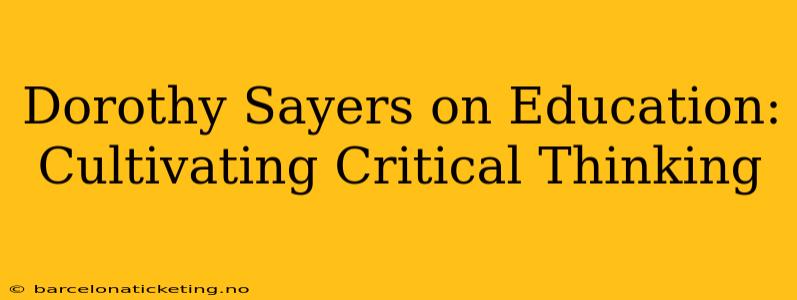Dorothy L. Sayers, renowned for her detective fiction featuring Lord Peter Wimsey, was also a profound thinker on education. Her essay, "The Lost Tools of Learning," remains a highly relevant critique of modern educational practices and a powerful advocacy for cultivating critical thinking. Sayers argued that education shouldn't merely focus on the acquisition of facts but on the development of a well-rounded individual capable of independent thought and judgment. This exploration delves into her insightful perspective, examining her key arguments and their enduring significance.
What were Dorothy Sayers's main criticisms of education?
Sayers's central critique revolved around the fragmented and utilitarian approach to education prevalent in her time (and still echoing today). She lamented the emphasis on specialization at the expense of a broad, liberal education. She believed this approach failed to equip students with the essential tools necessary for independent thought and effective communication—tools she termed "the lost tools of learning." These tools, according to Sayers, included grammar, logic, and rhetoric—the trivium of classical education. Her criticism wasn't simply about nostalgic adherence to tradition; rather, it was a pragmatic argument for developing skills crucial for navigating complexity and engaging in reasoned discourse. She argued that without a solid foundation in these disciplines, students lacked the ability to analyze information critically, to form coherent arguments, and to communicate their ideas effectively.
What did Dorothy Sayers mean by the "Lost Tools of Learning"?
The "lost tools" for Sayers weren't simply dusty relics of the past; they represented fundamental intellectual disciplines crucial for independent thinking.
-
Grammar: This wasn't simply about memorizing grammatical rules. Sayers emphasized grammar's role in understanding the structure of language and the precise use of words. A strong grasp of grammar enables clear and nuanced communication, fostering critical analysis of both written and spoken communication.
-
Logic: This involved the ability to reason effectively, to identify fallacies, and to construct sound arguments. Logic equips individuals with the skills to analyze information objectively, to discern truth from falsehood, and to engage in productive debate. Sayers saw this as vital for navigating a world filled with competing claims and persuasive rhetoric.
-
Rhetoric: This wasn't about mere eloquence but about the art of persuasive communication. Sayers highlighted rhetoric's importance in structuring arguments effectively, in adapting communication styles to different audiences, and in presenting ideas compellingly. It's the skill of clear, compelling argumentation, crucial for engaging in meaningful dialogue and influencing others.
How does Dorothy Sayers's approach relate to critical thinking?
Sayers's emphasis on grammar, logic, and rhetoric forms a powerful framework for cultivating critical thinking. By mastering these tools, individuals gain the ability to:
- Analyze information critically: They can dissect arguments, identify biases, and evaluate the validity of evidence.
- Formulate well-reasoned arguments: They can construct coherent and persuasive arguments supported by evidence and logical reasoning.
- Communicate effectively: They can articulate their ideas clearly, persuasively, and respectfully.
- Solve problems creatively: The analytical and communicative skills fostered by these disciplines are essential for tackling complex problems.
Why is Dorothy Sayers's work on education still relevant today?
Sayers's insights remain strikingly relevant in our contemporary information age, saturated with misinformation and persuasive narratives. The ability to think critically, to discern truth from falsehood, and to communicate effectively is paramount. Her work serves as a timely reminder of the need for a more holistic approach to education—one that prioritizes the cultivation of intellectual skills alongside the acquisition of factual knowledge. Her emphasis on the “lost tools” is a powerful call for a return to fundamental skills that empower individuals to engage actively and intelligently with the complexities of the world. The importance of critical thinking, in a world increasingly reliant on information literacy and effective communication, cannot be overstated. Sayers’s work provides a timeless framework for understanding and addressing this crucial need.
What are some practical applications of Sayers's ideas in modern education?
Sayers's ideas can be practically applied in modern education through various methods:
- Integrating classical education principles: Incorporating elements of grammar, logic, and rhetoric into curricula across various subjects.
- Emphasis on debate and discussion: Encouraging classroom activities that promote critical thinking, argumentation, and reasoned discourse.
- Promoting clear and concise writing: Developing students' ability to articulate their thoughts clearly and persuasively.
- Teaching information literacy: Equipping students with the skills to evaluate information sources critically and identify misinformation.
Dorothy Sayers's work offers a timeless perspective on education, reminding us of the enduring importance of cultivating critical thinking. Her call to recover the "lost tools of learning" remains a vital challenge for educators and students alike, urging a shift towards a more holistic and intellectually empowering approach to education.

